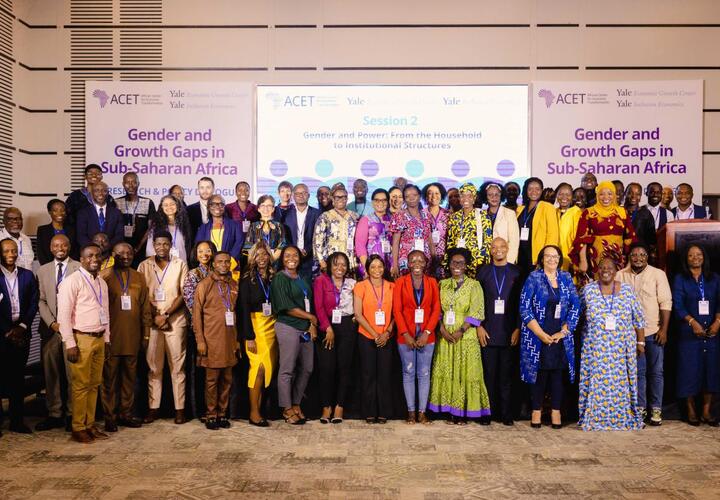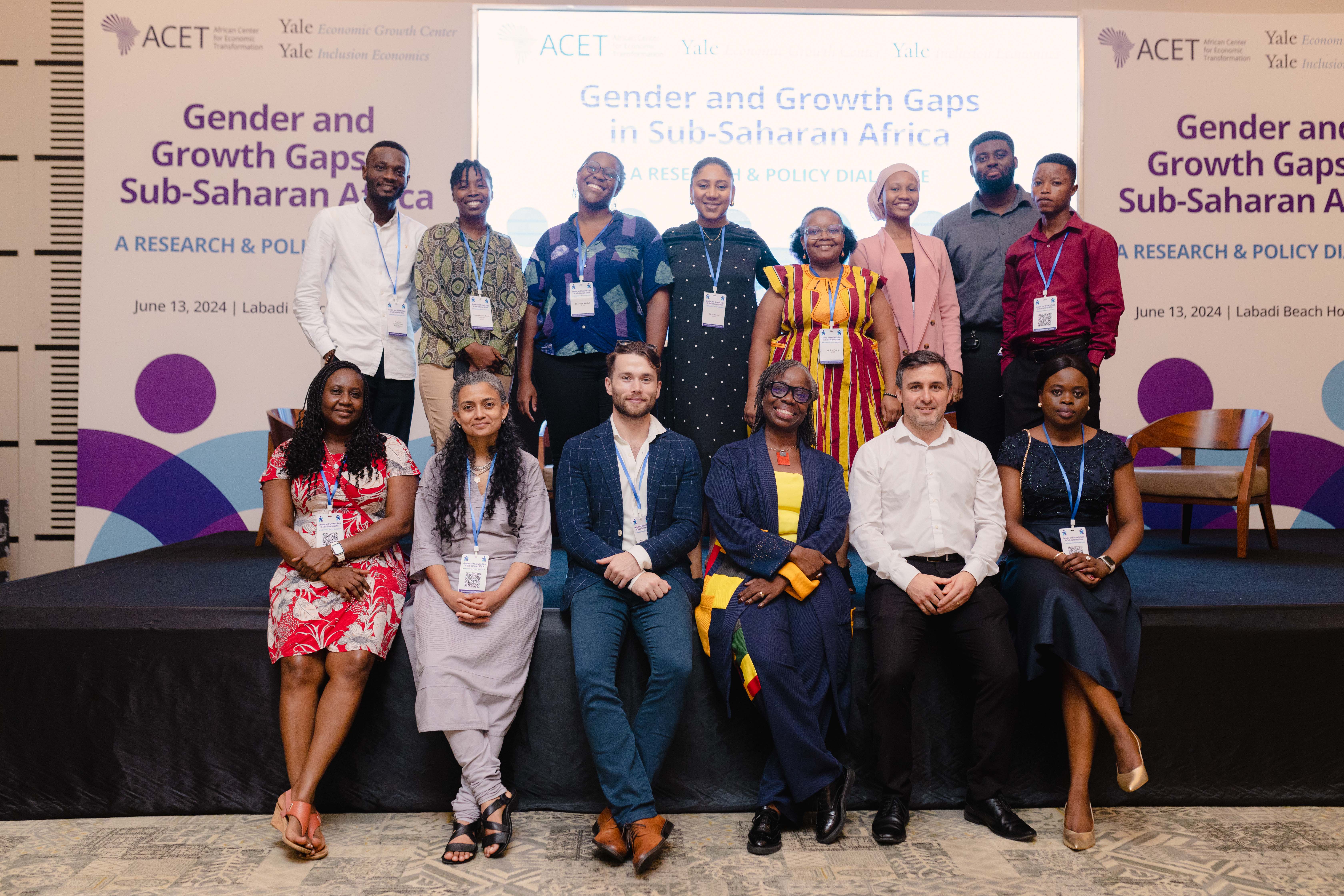Insights for policy and practice to reduce gender gaps in African labor markets highlighted at EGC event in Accra, Ghana
The Economic Growth Center and Inclusion Economics at Yale University, in partnership with the African Center for Economic Transformation (ACET), held a research and policy dialogue on “Gender and Growth Gaps in Sub-Saharan Africa.” The June 13 event featured former government ministers, representatives from industry, civil society, and multilateral organizations, and researchers.

The shift from an agriculture-based economy to manufacturing and services creates new opportunities for women and men to thrive, yet progress on gender equality has been remarkably uneven around the world. In sub-Saharan Africa (SSA), for example, the gender gap in labor force participation tends to be small, yet women’s earnings are substantially lower than those of men. Moreover, outside of agriculture, 82% of women are engaged in informal employment, which is typically less stable and lucrative, compared to 73% of men.
As the region with the lowest average age in the world, SSA has immense potential. But it also faces significant challenges in enabling its young women to pursue opportunities for human capital development and career advancement on par with their male peers. Moreover, shocks such as Covid-19 and climate breakdowns threaten to exacerbate existing inequalities. What can policy do to level the playing field?
The Yale Economic Growth Center (EGC) and Yale Inclusion Economics (YIE) partnered with the African Center for Economic Transformation (ACET) to conduct a one-day in-person research and policy dialogue on "Gender and Growth Gaps in Sub-Saharan Africa” on June 13, 2024. The event held in Accra, Ghana explored research-based directions for policy and practice on reducing the gender gaps that constrain women’s ability to fully capture the benefits of economic and social participation. As countries in SSA embark on diverse growth strategies, the event brought together researchers, policymakers, practitioners, civil society, industry, and journalists in discussion for facilitating a deeper understanding of the relationship between economic growth and gender disparities in the region.
To start a packed agenda, Hon. Williametta Saydee-Tarr, Liberia’s former Minister of Gender, Children & Social Protection, and Hon. Nana Oye Bampoe Addo, Ghana’s former Minister of Gender, Children & Social Protection, engaged in a keynote dialogue moderated by Mavis Owusu-Gyamfi, ACET’s Executive Vice President. The dialogue highlighted the leaders’ experiences working to mainstream gender in social and economic policies throughout their tenures as senior policymakers. They reflected on their efforts to “intentionally and purposefully” coordinate their governments towards improved outcomes for women and marginalized groups, sharing key strategies that were effective in advancing gender equality.

The workshop included three plenary sessions in which researchers presented findings from cutting-edge studies across a range of topics, including: macroeconomic growth strategies and gender gaps in key labor market indicators, gender and power from households to institutions, and the rise of the digital economy and its gendered implications. These presentations were followed by panel discussions in which stakeholders from academia, policy, civil society, and industry reflected on the research findings and contributed their own perspectives. In the afternoon, parallel working sessions provided an opportunity for small-group discussions on gender and climate adaptation challenges; measurement of gender gaps, norms, and economic agency; and gender, youth, and jobs in the digital age. All slide decks presented at the event and speaker biographies can be found here.
The discussions highlighted a number of key insights. First, SSA countries have high levels of inequality: according to the World Inequality Database, SSA’s Gini index for income is 0.67, which is only exceeded globally by the Middle East and North Africa (MENA) region and Latin America. Likewise, 95% of wealth in SSA is owned by the richest 10% of the population, compared to 77% globally. A key dimension of inequality in SSA is gendered wage inequality, which is partially driven by the fact that women and men in the region typically occupy different types of jobs. While the region's recent growth has been impressive, it has not fully translated to an increase in jobs, and gender gaps in tertiary education remain a concern. Given the absence of a clear relationship between GDP growth and gender gap closures in key labor market indicators, the event highlighted the importance of collecting and analyzing data on a range of indicators to measure progress or stasis in closing specific gender gaps, and designing targeted policy approaches aimed at addressing gender gaps, including in new industries/services. Participants also highlighted the need to better facilitate connections across stakeholder groups to share existing data and maximize its use in policy.
The event also underscored the widespread prevalence of restrictive gender norms and unequal underlying power structures at the level of societal leadership and within households, alongside noting that achieving gender parity might require starting early with how children are introduced to societal roles. Participants also emphasized that if women are to benefit equitably from the growing digital economy, policy must address the wide-ranging barriers they face in terms of deepening productive usage even where digital access exists, investing in education and digital skills, and addressing normative barriers. Finally, the event stressed the importance of partnership and collaboration, both within government (across different line ministries), and between government, industry, civil society, and development partners in each country, towards delivering tangible results in advancing gender equality.
"I am honored to have participated in this timely workshop, where academics, policymakers, and private sector actors met on one platform. They demonstrated that they each have one essential ingredient in the recipe for designing result-driven policies to address the gender gaps in the continent. EGC at Yale University in collaboration with ACET have practically shown that bridging the gap between research and policy is of the utmost importance." – Maty Konte, Senior Economist, International Finance Corporation - World Bank Group

June 13, 2024, Accra, Ghana: Team members from African Center for Economic Transformation (ACET), the Yale Economic Growth Center, and Inclusion Economics at Yale University, and panelist Maty Konte from the IFC.
Summary prepared by Jonathan Bower with input from Erik Jorgensen, Aishwarya Lakshmi Ratan, and Vestal McIntyre. All photos by Steve Jay Studios.